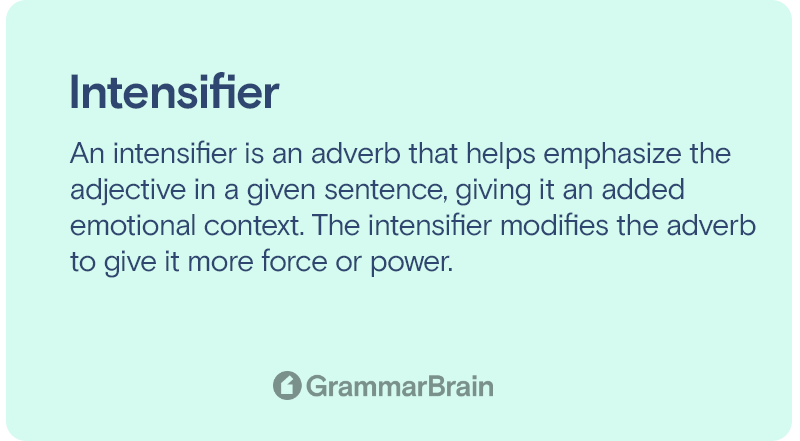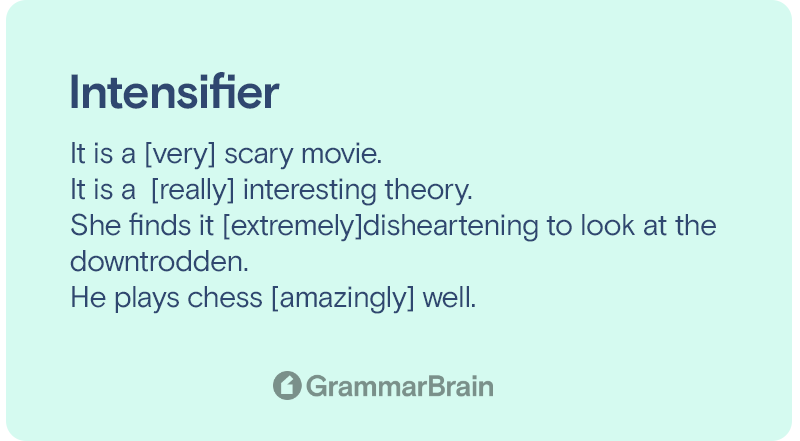What is an intensifier? How does an intensifier work? We love using words that add to the intensity of the adjective, making them stronger. These words have a special name in the English language called – the intensifier.
In this article, we’ll cover intensifiers in detail so that you’re able to make your adjectives more power-packed! Keep reading to learn more about these common words.

What is an intensifier?
An intensifier is an adverb that helps emphasize the adjective in a given sentence, giving it an added emotional context. The intensifier modifies the adverb to give it more force or power.
It functions as an expletive attribute in grammar as it does not add anything to the meaning of a sentence.
Some examples of intensifiers include the words – very, extremely, amazingly, exceptionally, particularly, unusually, etc.
The word ‘enough’ also functions as an intensifier. However, it comes after the adjective rather than coming before it.
For example:
- If you’re eighteen, you’re old enough to get married.
- I cannot wear those shirts, I am not big enough.
- That tunnel looks big enough to let us pass through it.
Definition of an intensifier
As per the Collins dictionary, an intensifier is “a word like ‘very’ that you can put in front of an adjective/adverb to make its meaning stronger.”
Another definition of an intensifier is “a linguistic element that usually increases the degree of emphasis to be given to the element it modifies.”

Examples of intensifiers in sentences
Let’s look at a few sentences with intensifiers to get a better understanding:
- It is a very scary movie.
- It is a really interesting theory.
- She finds it extremely disheartening to look at the downtrodden.
- He plays chess amazingly well.
- She is exceptionally wise for her age.
- He is incredibly fit at this age.
- This flat is good enough for me and my family.
- Their latest album was absolutely awful.
- I completely misunderstood his point during the debate.
- You look particularly attractive in that red dress.
How to identify an intensifier
Intensifiers can be identified by figuring out whether an adjective or adverb is being supported by an adverbial phrase (like very, so, too, rather, etc.) to make its meaning stronger.
Words that are commonly used as intensifiers include – highly, utterly, at all, and absolutely. etc. Apart from these common intensifiers, there are a few unique ones as well.
We use at all and on earth in certain sentences to emphasize negative expressions. Here are a few sentence examples:
- Are there no suitable dresses at all?
- I am afraid I am not at all pleased with your performance so far.
- What on earth is she up to these days? (conveys disapproval)
- Why did I ever invite them to the marriage ceremony? (suggests an issue)
How to use an intensifier
Certain intensifiers like ‘completely’, ‘absolutely’ & ‘really’ do not add anything to the reader’s comprehension. It is alright to use these adverb modifiers while speaking, however in writing it is best to avoid these particular intensifiers and use other ones.
These common intensifiers do give strength to the dull adverb but make the reading experience quite bland. So, instead of writing – the statue is “really pretty”, write – the statue was “stunning”.
Similarly, instead of writing – I am “very sure”, write – I am “certain” instead. Here’s a list of suitable intensifiers that can be used in place of very, totally, really, etc.
- very big – huge
- very small – tiny
- very clever – ingenious
- very bad – disgusting
- very good – splendid
- very tasty – flavorsome
It is also important to note that certain intensifiers should be paired with specific adjectives, depending on the meaning of the adjective. For example, we use the term highly with adjectives like – likely, unlikely, intelligent, talented, etc.
Correct use – “He is a highly talented individual.”
Incorrect use – “She had a highly tasty dinner yesterday.”
We can also use the intensifier – ‘bitterly’ with adjectives that connote negative expressions. Here are a few examples:
- She was bitterly unhappy at the party.
- The team was bitterly disappointed to lose in the finals.
- It can get bitterly cold in the Arctic.
Using intensifiers with comparative and superlative adjectives
We use a particular set of intensifiers (words & phrases) with comparative adjectives. Some of these intensifiers are – quite a lot, a good deal, a fair bit, etc.
Here are a few sentence examples:
- She is much older than me.
- China is a lot bigger than India.
- He is a far better painter than Picasso.
In the case of superlative adjectives, we use ‘by far’ and ‘easily’ as intensifiers. Some sentence examples are given below:
- Mount Everest is easily the tallest mountain in the world.
- This gaming laptop was by far the most expensive.
Using adjectives as intensifiers
Some adjectives can be treated as intensifiers when paired with a noun. Some of these adjectives are – absolute, complete, total, utter, perfect, etc.
Here are a few sentence examples:
- Ryan is a complete idiot.
- The chairman was talking utter nonsense.
- This is absolute rubbish.
- The meeting turned out to be a complete disaster.
- The situation is a total mess right now.
FAQs
What is another word for intensifiers?
In English grammar, an intensifier is also called a booster or an amplifier.
Why are intensifiers important?
They are important because they can provide useful details about other words in a given sentence. As they go with several adverbs and adjectives, you can figure out the meaning of unknown words through your knowledge of intensifiers.
When should we not use intensifiers?
It is better to not use intensifiers with strong adjectives like – awful, enormous, brilliant, delicious, excellent, etc.
Is pretty an intensifier?
What’s the opposite of intensifiers?
The opposite of intensifiers are mitigators and we use them to make adjectives less strong. Some sentence examples are as follows:
- The movie was quite awful.
- He is a bit younger than me.
- This is a slightly bigger model than that.
Do intensifiers modify adjectives?
Intensifiers tend to modify adjectives, but they can modify adverbs too.
What is a common intensifier?
“At all” is a common intensifier. Other intensifiers include: amazingly, exceptionally, incredibly.
Inside this article
Fact checked:
Content is rigorously reviewed by a team of qualified and experienced fact checkers. Fact checkers review articles for factual accuracy, relevance, and timeliness. Learn more.
Core lessons
Glossary
- Abstract Noun
- Accusative Case
- Anecdote
- Antonym
- Active Sentence
- Adverb
- Adjective
- Allegory
- Alliteration
- Adjective Clause
- Adjective Phrase
- Ampersand
- Anastrophe
- Adverbial Clause
- Appositive Phrase
- Clause
- Compound Adjective
- Complex Sentence
- Compound Words
- Compound Predicate
- Common Noun
- Comparative Adjective
- Comparative and Superlative
- Compound Noun
- Compound Subject
- Compound Sentence
- Copular Verb
- Collective Noun
- Colloquialism
- Conciseness
- Consonance
- Conditional
- Concrete Noun
- Conjunction
- Conjugation
- Conditional Sentence
- Comma Splice
- Correlative Conjunction
- Coordinating Conjunction
- Coordinate Adjective
- Cumulative Adjective
- Dative Case
- Determiner
- Declarative Sentence
- Declarative Statement
- Direct Object Pronoun
- Direct Object
- Diction
- Diphthong
- Dangling Modifier
- Demonstrative Pronoun
- Demonstrative Adjective
- Direct Characterization
- Definite Article
- Doublespeak
- False Dilemma Fallacy
- Future Perfect Progressive
- Future Simple
- Future Perfect Continuous
- Future Perfect
- First Conditional
- Irregular Adjective
- Irregular Verb
- Imperative Sentence
- Indefinite Article
- Intransitive Verb
- Introductory Phrase
- Indefinite Pronoun
- Indirect Characterization
- Interrogative Sentence
- Intensive Pronoun
- Inanimate Object
- Indefinite Tense
- Infinitive Phrase
- Interjection
- Intensifier
- Infinitive
- Indicative Mood
- Participle
- Parallelism
- Prepositional Phrase
- Past Simple Tense
- Past Continuous Tense
- Past Perfect Tense
- Past Progressive Tense
- Present Simple Tense
- Present Perfect Tense
- Personal Pronoun
- Personification
- Persuasive Writing
- Parallel Structure
- Phrasal Verb
- Predicate Adjective
- Predicate Nominative
- Phonetic Language
- Plural Noun
- Punctuation
- Punctuation Marks
- Preposition
- Preposition of Place
- Parts of Speech
- Possessive Adjective
- Possessive Determiner
- Possessive Case
- Possessive Noun
- Proper Adjective
- Proper Noun
- Present Participle
- Prefix
- Predicate



